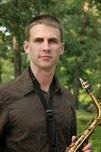Psalm-thing else: Butler jazz professor heads a quartet of local stars in an album of originals
It's rare for musical compositions based on the biblical Book of Psalms to be free of verbal references. But Matt Pivec, Butler University's director of jazz studies, links his purely instrumental music on "Psalm Songs" to his fondness for that book — so extravagant in its intimate communication with God, so dependent on turning devotion into enduring words of praise and complaint. Not necessarily, Pivec seems to be saying with his saxophones and all-star rhythm section,
His brief booklet note with this 2013 recording links his inspiration to the Psalms' references to the natural world "in all its dimensions — power, beauty, destruction, creation, strength and fragility." Quite a burden for a jazz record to bear without sounding strained and pretentious! But the saxophonist and his colleagues on this project are straightforward, focused, imaginative, and nimble throughout the seven tunes.
From the outset, in "As Far As the East," it's easy to find the quartet's music-making infectiously swinging. Putting his sticks aside and focusing on tambourine, Kenny Phelps lays down a winning groove. The catchy theme, allowing modal exploration, receives a delightful exposition from Pivec and the rest of the band: Steve Allee, piano, and Frank Smith, bass.
Pivec's tone on tenor is robust but never overbearing. He has a singer's knack for melody that he sustains throughout his soloing. Without interruption, the second track — "One End of the Sky" — opens up with an indistinct pulse that becomes four-to-the-bar swing. All four players seem to have a fine sense of proportion and put genuine cogency behind their solos.
Phelps' percussion choices are often inspired — soft-headed sticks, then likely a bell tree, on "Whiter Than Snow," for instance. He has a great solo near the end against piano chords. Allee's earlier solo shows the same feeling for melody the leader displays. The tune's intensity never goes out of bounds; a gentle mood obtains throughout. "Can't Take It With," with a recurring phrase that fits the title, sports a catchy pulse with Phelps' typical sensitivity to tone (here, the interplay of rim and small-cymbal patterns).
"Like the Cedars" takes a bebop approach, but in a relaxed vein, its unison tenor-piano line unfolding easily. Pivec plays the way he writes, his solos evincing a fine breadth, rangy without showing off. Of his compositions, I found only "Days Gone By," despite the surface allure of Pivec's floating soprano, somewhat directionless — until a pointed Allee solo pulls it into shape.
The disc's finale, "Head and Beard," has a theme characterized by separated two-chord phrases. This allows lots of space between the tune's main elements, showcasing a dappled ensemble sound in which Smith's bass takes on welcome prominence. The title puns upon Eric Dolphy's eccentrically striding Monk tribute, "Hat and Beard," though Pivec doesn't parody that tune. He's got something else in mind, quite possibly a tribute to the generative Psalmist himself.
His brief booklet note with this 2013 recording links his inspiration to the Psalms' references to the natural world "in all its dimensions — power, beauty, destruction, creation, strength and fragility." Quite a burden for a jazz record to bear without sounding strained and pretentious! But the saxophonist and his colleagues on this project are straightforward, focused, imaginative, and nimble throughout the seven tunes.
From the outset, in "As Far As the East," it's easy to find the quartet's music-making infectiously swinging. Putting his sticks aside and focusing on tambourine, Kenny Phelps lays down a winning groove. The catchy theme, allowing modal exploration, receives a delightful exposition from Pivec and the rest of the band: Steve Allee, piano, and Frank Smith, bass.
 |
| Matt Pivec directs jazz studies at Butler. |
Pivec's tone on tenor is robust but never overbearing. He has a singer's knack for melody that he sustains throughout his soloing. Without interruption, the second track — "One End of the Sky" — opens up with an indistinct pulse that becomes four-to-the-bar swing. All four players seem to have a fine sense of proportion and put genuine cogency behind their solos.
Phelps' percussion choices are often inspired — soft-headed sticks, then likely a bell tree, on "Whiter Than Snow," for instance. He has a great solo near the end against piano chords. Allee's earlier solo shows the same feeling for melody the leader displays. The tune's intensity never goes out of bounds; a gentle mood obtains throughout. "Can't Take It With," with a recurring phrase that fits the title, sports a catchy pulse with Phelps' typical sensitivity to tone (here, the interplay of rim and small-cymbal patterns).
"Like the Cedars" takes a bebop approach, but in a relaxed vein, its unison tenor-piano line unfolding easily. Pivec plays the way he writes, his solos evincing a fine breadth, rangy without showing off. Of his compositions, I found only "Days Gone By," despite the surface allure of Pivec's floating soprano, somewhat directionless — until a pointed Allee solo pulls it into shape.
The disc's finale, "Head and Beard," has a theme characterized by separated two-chord phrases. This allows lots of space between the tune's main elements, showcasing a dappled ensemble sound in which Smith's bass takes on welcome prominence. The title puns upon Eric Dolphy's eccentrically striding Monk tribute, "Hat and Beard," though Pivec doesn't parody that tune. He's got something else in mind, quite possibly a tribute to the generative Psalmist himself.



Comments
Post a Comment